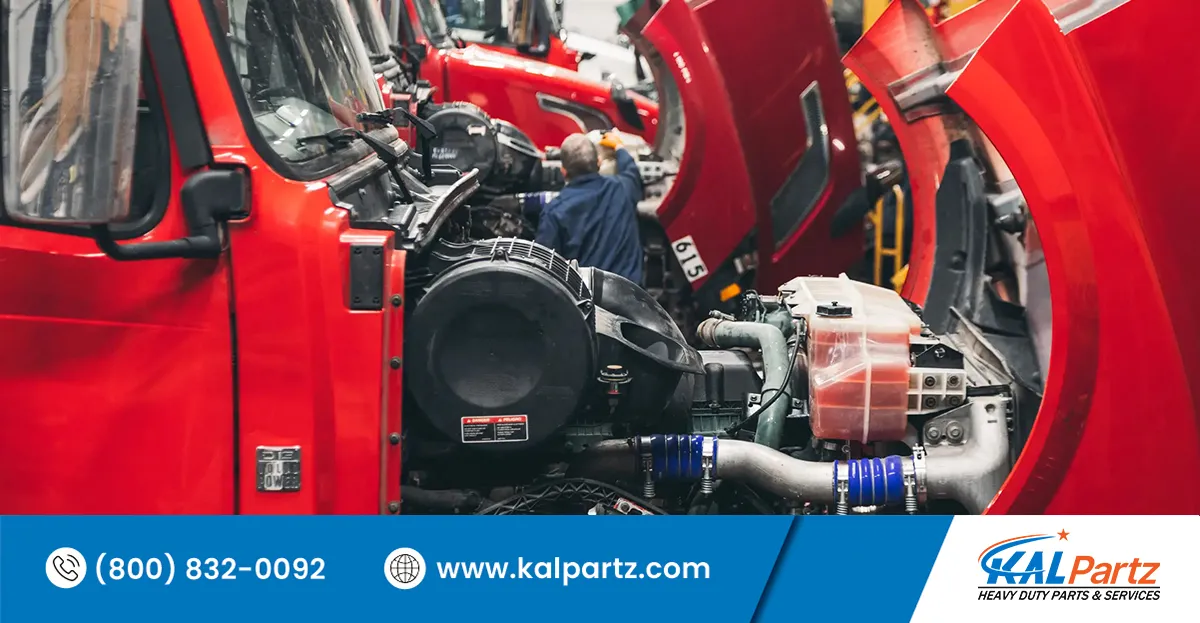The frustration of managing a broken-down truck is very real, and if you are confused about choosing a replacement, this is the place. Welcome to your go-to source for effective guides and tips all related to heavy-duty truck and trailer parts. Let’s explore the best option for your fleet, OEM or Aftermarket Parts.
Choosing OEM parts
Original Equipment Manufacturer (OEM) parts are automotive components or modules produced by the manufacturer who originally made the vehicle. With the replacement being an exact clone of the part you are replacing, it eases out the decision fatigue and does-away with concerns of compatibility, quality, performance, etc.
Availability
OEM parts are difficult to hunt down, especially if your vehicle is old. Moreover, OEM parts replacements are ordered through time-consuming exclusive dealerships. This will cost your fleet business money and valuable time.
Quality and Performance
OEM parts come in the right size and fit for your vehicle’s pre-build, where you receive the same grade of performance and quality as the initial part without compromise.
Price and warranty
OEM parts certify strict quality and compatibility testing to suit the specifications of your truck and trailer parts. Making them highly reliable and reflective of their upfront costs. They provide added security against future issues with tidy warranties, sometimes outdoing the original warranty.
Prospects of Aftermarket Parts
Aftermarket parts are the polar opposite of OEM parts. Not the original company, but third-party manufacturers, produce them. Unlike OEM parts, aftermarket parts are not designed to fit a particular make or model but to several configurations.
Aftermarket parts are versatile. It is well-known to the industry that aftermarket parts are faster at undertaking design flaws found in OEM products. Reason why many fleet owners switch to the aftermarket. Let's take a closer look.
Availability
You can easily find a couple of vendors for any part you need and waste no time buying replacements. Compared to OEM parts, aftermarket purchases are more readily available for commercial assets like heavy-duty truck parts, online and offline.
Quality and Performance
They have an all-round design to fit multiple makes and models, and some upgrades even surpass OEM performance and offer optimal performance and quality. However, compatibility issues can occur with your vehicle specifications and vary in durability.
Warranty and Price
Aftermarket parts are economical, as they have less to recoup. High-quality aftermarket products do offer competitive and standard warranties, but they can vary in duration and coverage.
How to Decide
Take into account
- Vehicle’s requirements
- Criticality
- Your budget
For cost effective alternatives, aftermarket offers optimal solutions while addressing urgency with high availability rates.
For an older vehicle, it is better to go for aftermarket options, as installing an OEM part in a vehicle with a shorter life span may not be fruitful. For performance or an innovative upgrade, the aftermarket is great too.
If the part requiring replacement is a critical component of your engine, e.g the radiator, looking into OEM options could help you find reliable options. Though, it can be expensive.
Conclusion
Maintaining heavy assets like commercial truck and trailer parts prevents downtime and costly failures. When it comes to replacements, there are two main options: OEM parts and aftermarket parts.
Where OEM parts offer confident quality, compatibility, reliability, and worthwhile warranties. Aftermarket parts provide cost-effective alternatives with innovative options not available from OEM. Each has its pros and cons, so the choice should be based on specific needs.
Explore Your Options
Browse our aftermarket parts online inventory or visit our store to find almost any part for your heavy-duty vehicle needs. Don’t compromise on quality, performance, or safety. Get expert support, competitive prices and buy brands like Denso, Everco HD, Hendrikson, Fleetguard, etc.


.webp)
.webp)
.webp)

